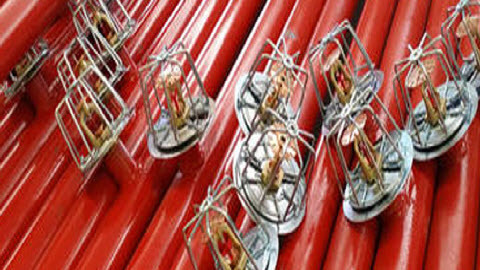What determines where and when sprinklers are required? Building codes over the past two decades have increasingly called for sprinklers throughout buildings for life safety.
In 1890 Frederick Grinnell was the innovator who improved the fire sprinkler system, as he invented sprinkler heads fitted with glass bulbs that broke following exposure to heat. This is essentially the same technology that is used today.
Have you ever lit a candle to fill your home with fragrance and then forgotten about it? An unattended candle creates an open flame that could easily spark a fire. Luckily, fire sprinklers can help even when you don’t remember leaving the candle lit.
An advantage to choosing us for your home or business sprinkler system is our expertise in handling any issues that may arise. We are experienced in maintenance and repairs, as well as installation of new systems.
Did you know that automatic fire sprinklers have been in use in the U.S. since 1874?
When a home or other building has a fire sprinkler system, it protects the lives of the firefighters who are called to fight the blaze. In a recent study by the NFPA, there is a 65% reduction in firefighter injuries at sites with fire sprinkler systems installed.
If you think fire sprinklers will cause devastating water damage in the event of a fire, guess again. In over 80 percent of fires, only one or two sprinklers are required to extinguish the blaze.
Did you know that if you have a reported fire in your home, the risk of dying decreases by about 80 percent when sprinklers are present?
Don't be confused into thinking that sprinkler systems are not cost-efficient in homes. We can show you the different systems available for homes, and a price that is probably lower than you think.
Do you feel that your home doesn’t need fire sprinklers because of a rapid response time by emergency services in your area? Remember, in many cases, fire sprinklers can put out the fire before first responders arrive.
A Harris International Interactive poll showed almost two-thirds of U.S. homeowners believe a sprinkler system increases a home’s value. Forty-five percent of respondents said a home with sprinklers is more desirable than one without the system.
Are you building a new home or work place? Including fire sprinklers puts your property on the cutting edge and will give it a distinct security advantage that homebuyers, property developers and commercial investors are looking for.
Did you know that fire sprinklers can actually increase the value of your home? If you are selling, be sure to feature your fire sprinklers in your listing materials, as they are a great safety feature that can attract buyers.
Fire sprinkler systems can really limit the amount of damage done to your home in the event of a fire. In fact, one study found that the average loss in a home protected with sprinklers was just over $2,000, while in an unprotected home it was closer to $45,000.
We recognize how expensive it can be to make repairs to units after the residents have accidentally started a fire. While a fire sprinkler may not be able to stop all damage before it starts, it can certainly limit the area in which you must make repairs.
You probably already know structure fires can be life threatening. Care to guess the number of civilian deaths in structure fires for the 2013 calendar year? If you guessed 2,855 deaths, you're right.
Do you have an escape plan in place in the event of a fire in your home or business? To keep your family or employees safe, develop a safety plan and conduct regular fire drills.
Can you guess the major cause of avoidable deaths in commercial structure fires? If you guessed arson, you're right. Arson may be more common than you think, too. In 2013, arson fires caused over $663 million in property damage nationwide.
Did you know that cooking fires account for roughly 40 percent of all house fires in the US each year? Getting called away from something frying on the stove for a few minutes is all it takes to start a fire.
Did you know that home fires account for the largest percentage of fire deaths, as well as the largest share of injuries and direct property damage? Residential fire sprinkler systems catch fires and begin to suppress them before they have a chance to really get going.
Different sprinkler heads will be rated to different levels depending on their trigger temperature. For example, a 155° sprinkler head will trigger when the air around it reaches 155° F. An expert will match up the right head rating to the right application.
When you’ve never had a fire sprinkler system in your office building before, you may worry about water damage to equipment that’s not even in danger from the fire. Remember, a typical fire sprinkler will only activate when it’s within proximity of the fire.
You probably perform regular fire drills at your work. Adopt a fire drill plan at home, too. Designate an outdoor meeting area, and make sure family members have two means of emergency escape from every location in your home.



